Independent Learning: Benefits, Importance, and Impact on Education
VerifiedAdded on 2020/10/22
|7
|1513
|356
Essay
AI Summary
This essay delves into the significance and advantages of independent learning, often referred to as self-directed study, within the context of higher education. It emphasizes that independent learning is a key approach for gaining wisdom and knowledge, which is crucial for academic success. The essay highlights both internal factors, such as cognitive skills, and external factors, such as the learning environment, that contribute to effective self-learning. It discusses how self-learning fosters student autonomy, improves academic performance, increases motivation and confidence, and develops essential skills like time management and critical thinking. The essay also stresses the importance of a positive relationship between teachers and students in facilitating successful independent learning and provides insights into how educators can support and promote self-learning strategies. The essay concludes by underscoring the lifelong value of independent learning in enhancing creativity, intellectual curiosity, and the ability to overcome challenges, ultimately preparing students for success in both their academic and professional lives.
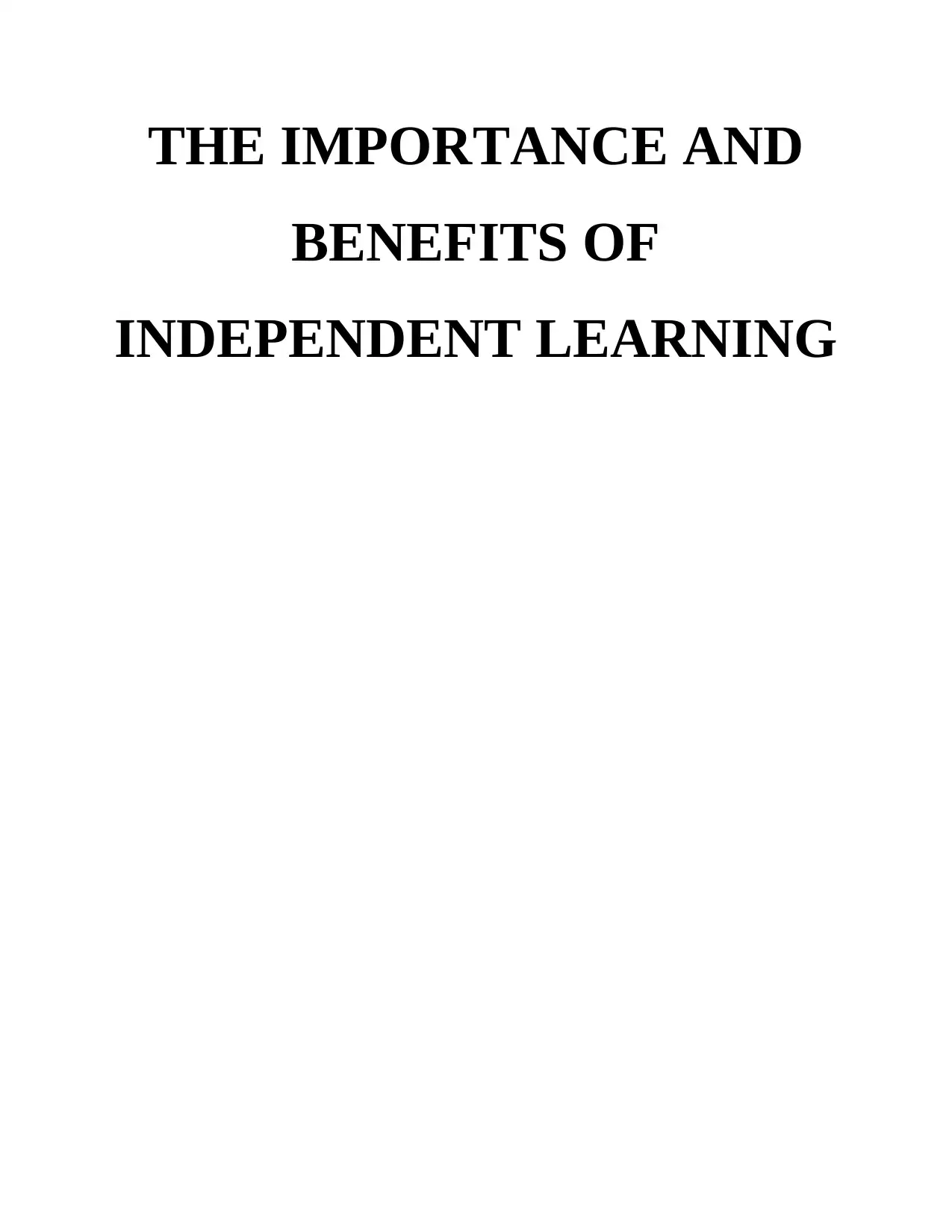
THE IMPORTANCE AND
BENEFITS OF
INDEPENDENT LEARNING
BENEFITS OF
INDEPENDENT LEARNING
Paraphrase This Document
Need a fresh take? Get an instant paraphrase of this document with our AI Paraphraser

TABLE OF CONTENTS
INTRODUCTION...........................................................................................................................1
MAINBODY...................................................................................................................................1
CONCLUSION................................................................................................................................1
REFERENCES................................................................................................................................2
INTRODUCTION...........................................................................................................................1
MAINBODY...................................................................................................................................1
CONCLUSION................................................................................................................................1
REFERENCES................................................................................................................................2
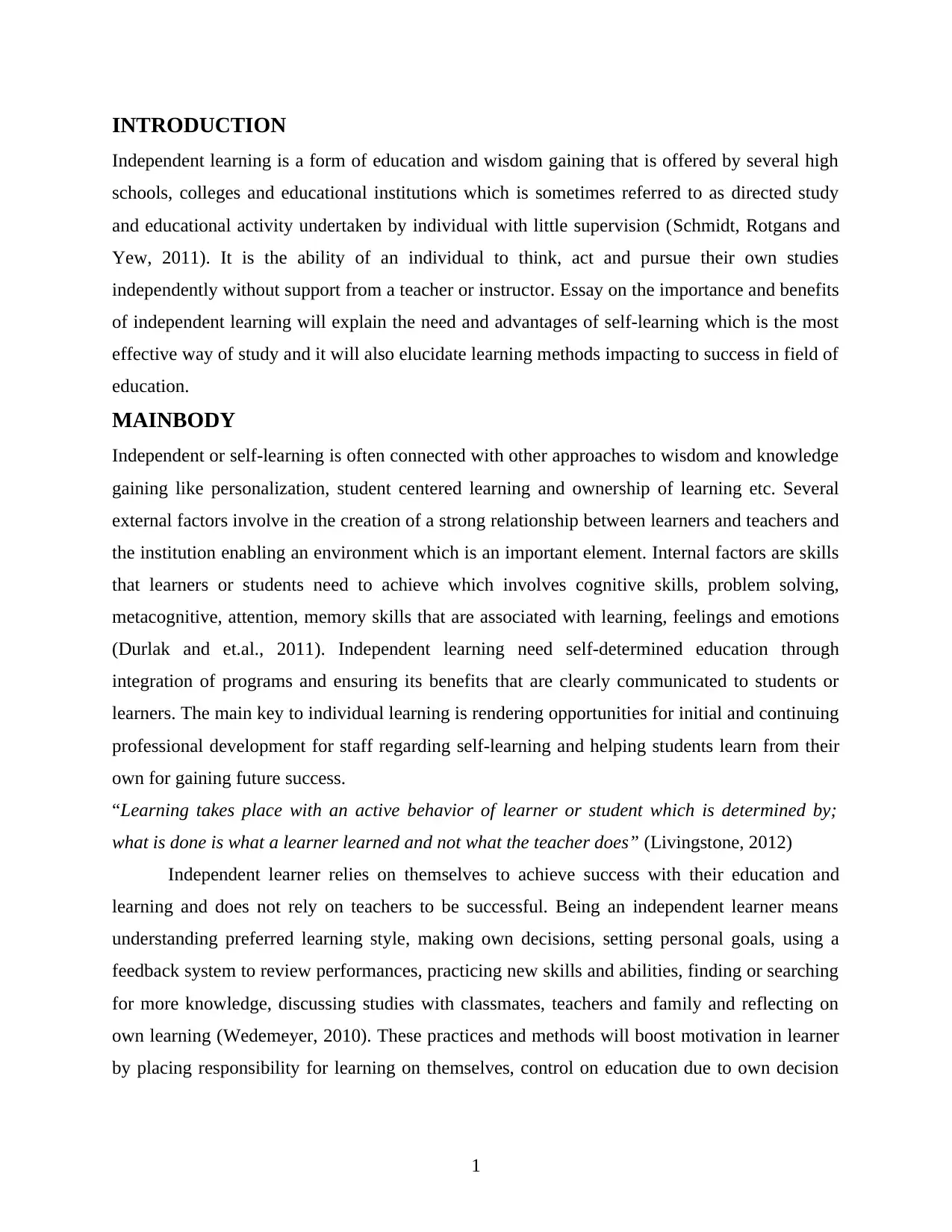
INTRODUCTION
Independent learning is a form of education and wisdom gaining that is offered by several high
schools, colleges and educational institutions which is sometimes referred to as directed study
and educational activity undertaken by individual with little supervision (Schmidt, Rotgans and
Yew, 2011). It is the ability of an individual to think, act and pursue their own studies
independently without support from a teacher or instructor. Essay on the importance and benefits
of independent learning will explain the need and advantages of self-learning which is the most
effective way of study and it will also elucidate learning methods impacting to success in field of
education.
MAINBODY
Independent or self-learning is often connected with other approaches to wisdom and knowledge
gaining like personalization, student centered learning and ownership of learning etc. Several
external factors involve in the creation of a strong relationship between learners and teachers and
the institution enabling an environment which is an important element. Internal factors are skills
that learners or students need to achieve which involves cognitive skills, problem solving,
metacognitive, attention, memory skills that are associated with learning, feelings and emotions
(Durlak and et.al., 2011). Independent learning need self-determined education through
integration of programs and ensuring its benefits that are clearly communicated to students or
learners. The main key to individual learning is rendering opportunities for initial and continuing
professional development for staff regarding self-learning and helping students learn from their
own for gaining future success.
“Learning takes place with an active behavior of learner or student which is determined by;
what is done is what a learner learned and not what the teacher does” (Livingstone, 2012)
Independent learner relies on themselves to achieve success with their education and
learning and does not rely on teachers to be successful. Being an independent learner means
understanding preferred learning style, making own decisions, setting personal goals, using a
feedback system to review performances, practicing new skills and abilities, finding or searching
for more knowledge, discussing studies with classmates, teachers and family and reflecting on
own learning (Wedemeyer, 2010). These practices and methods will boost motivation in learner
by placing responsibility for learning on themselves, control on education due to own decision
1
Independent learning is a form of education and wisdom gaining that is offered by several high
schools, colleges and educational institutions which is sometimes referred to as directed study
and educational activity undertaken by individual with little supervision (Schmidt, Rotgans and
Yew, 2011). It is the ability of an individual to think, act and pursue their own studies
independently without support from a teacher or instructor. Essay on the importance and benefits
of independent learning will explain the need and advantages of self-learning which is the most
effective way of study and it will also elucidate learning methods impacting to success in field of
education.
MAINBODY
Independent or self-learning is often connected with other approaches to wisdom and knowledge
gaining like personalization, student centered learning and ownership of learning etc. Several
external factors involve in the creation of a strong relationship between learners and teachers and
the institution enabling an environment which is an important element. Internal factors are skills
that learners or students need to achieve which involves cognitive skills, problem solving,
metacognitive, attention, memory skills that are associated with learning, feelings and emotions
(Durlak and et.al., 2011). Independent learning need self-determined education through
integration of programs and ensuring its benefits that are clearly communicated to students or
learners. The main key to individual learning is rendering opportunities for initial and continuing
professional development for staff regarding self-learning and helping students learn from their
own for gaining future success.
“Learning takes place with an active behavior of learner or student which is determined by;
what is done is what a learner learned and not what the teacher does” (Livingstone, 2012)
Independent learner relies on themselves to achieve success with their education and
learning and does not rely on teachers to be successful. Being an independent learner means
understanding preferred learning style, making own decisions, setting personal goals, using a
feedback system to review performances, practicing new skills and abilities, finding or searching
for more knowledge, discussing studies with classmates, teachers and family and reflecting on
own learning (Wedemeyer, 2010). These practices and methods will boost motivation in learner
by placing responsibility for learning on themselves, control on education due to own decision
1
⊘ This is a preview!⊘
Do you want full access?
Subscribe today to unlock all pages.

Trusted by 1+ million students worldwide
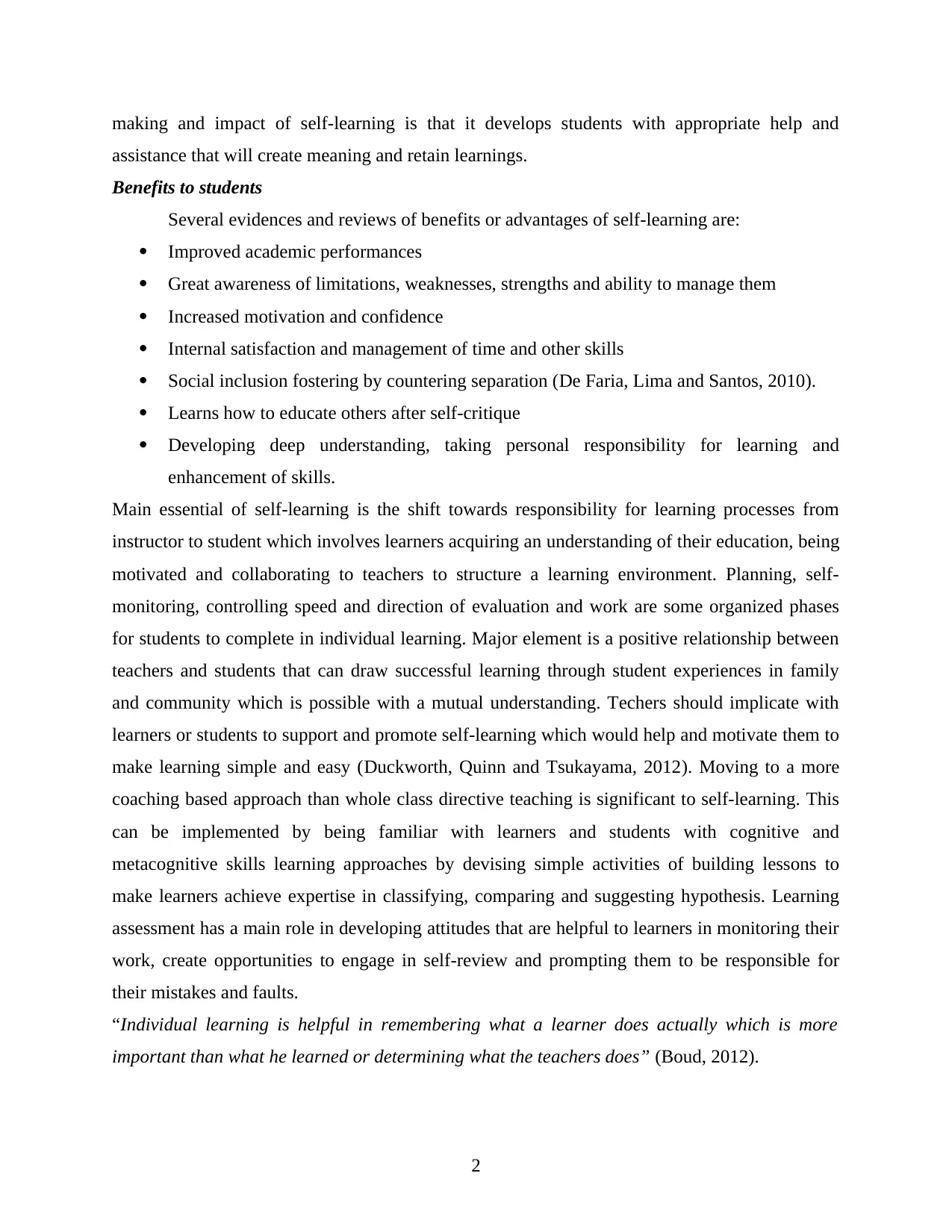
making and impact of self-learning is that it develops students with appropriate help and
assistance that will create meaning and retain learnings.
Benefits to students
Several evidences and reviews of benefits or advantages of self-learning are:
Improved academic performances
Great awareness of limitations, weaknesses, strengths and ability to manage them
Increased motivation and confidence
Internal satisfaction and management of time and other skills
Social inclusion fostering by countering separation (De Faria, Lima and Santos, 2010).
Learns how to educate others after self-critique
Developing deep understanding, taking personal responsibility for learning and
enhancement of skills.
Main essential of self-learning is the shift towards responsibility for learning processes from
instructor to student which involves learners acquiring an understanding of their education, being
motivated and collaborating to teachers to structure a learning environment. Planning, self-
monitoring, controlling speed and direction of evaluation and work are some organized phases
for students to complete in individual learning. Major element is a positive relationship between
teachers and students that can draw successful learning through student experiences in family
and community which is possible with a mutual understanding. Techers should implicate with
learners or students to support and promote self-learning which would help and motivate them to
make learning simple and easy (Duckworth, Quinn and Tsukayama, 2012). Moving to a more
coaching based approach than whole class directive teaching is significant to self-learning. This
can be implemented by being familiar with learners and students with cognitive and
metacognitive skills learning approaches by devising simple activities of building lessons to
make learners achieve expertise in classifying, comparing and suggesting hypothesis. Learning
assessment has a main role in developing attitudes that are helpful to learners in monitoring their
work, create opportunities to engage in self-review and prompting them to be responsible for
their mistakes and faults.
“Individual learning is helpful in remembering what a learner does actually which is more
important than what he learned or determining what the teachers does” (Boud, 2012).
2
assistance that will create meaning and retain learnings.
Benefits to students
Several evidences and reviews of benefits or advantages of self-learning are:
Improved academic performances
Great awareness of limitations, weaknesses, strengths and ability to manage them
Increased motivation and confidence
Internal satisfaction and management of time and other skills
Social inclusion fostering by countering separation (De Faria, Lima and Santos, 2010).
Learns how to educate others after self-critique
Developing deep understanding, taking personal responsibility for learning and
enhancement of skills.
Main essential of self-learning is the shift towards responsibility for learning processes from
instructor to student which involves learners acquiring an understanding of their education, being
motivated and collaborating to teachers to structure a learning environment. Planning, self-
monitoring, controlling speed and direction of evaluation and work are some organized phases
for students to complete in individual learning. Major element is a positive relationship between
teachers and students that can draw successful learning through student experiences in family
and community which is possible with a mutual understanding. Techers should implicate with
learners or students to support and promote self-learning which would help and motivate them to
make learning simple and easy (Duckworth, Quinn and Tsukayama, 2012). Moving to a more
coaching based approach than whole class directive teaching is significant to self-learning. This
can be implemented by being familiar with learners and students with cognitive and
metacognitive skills learning approaches by devising simple activities of building lessons to
make learners achieve expertise in classifying, comparing and suggesting hypothesis. Learning
assessment has a main role in developing attitudes that are helpful to learners in monitoring their
work, create opportunities to engage in self-review and prompting them to be responsible for
their mistakes and faults.
“Individual learning is helpful in remembering what a learner does actually which is more
important than what he learned or determining what the teachers does” (Boud, 2012).
2
Paraphrase This Document
Need a fresh take? Get an instant paraphrase of this document with our AI Paraphraser
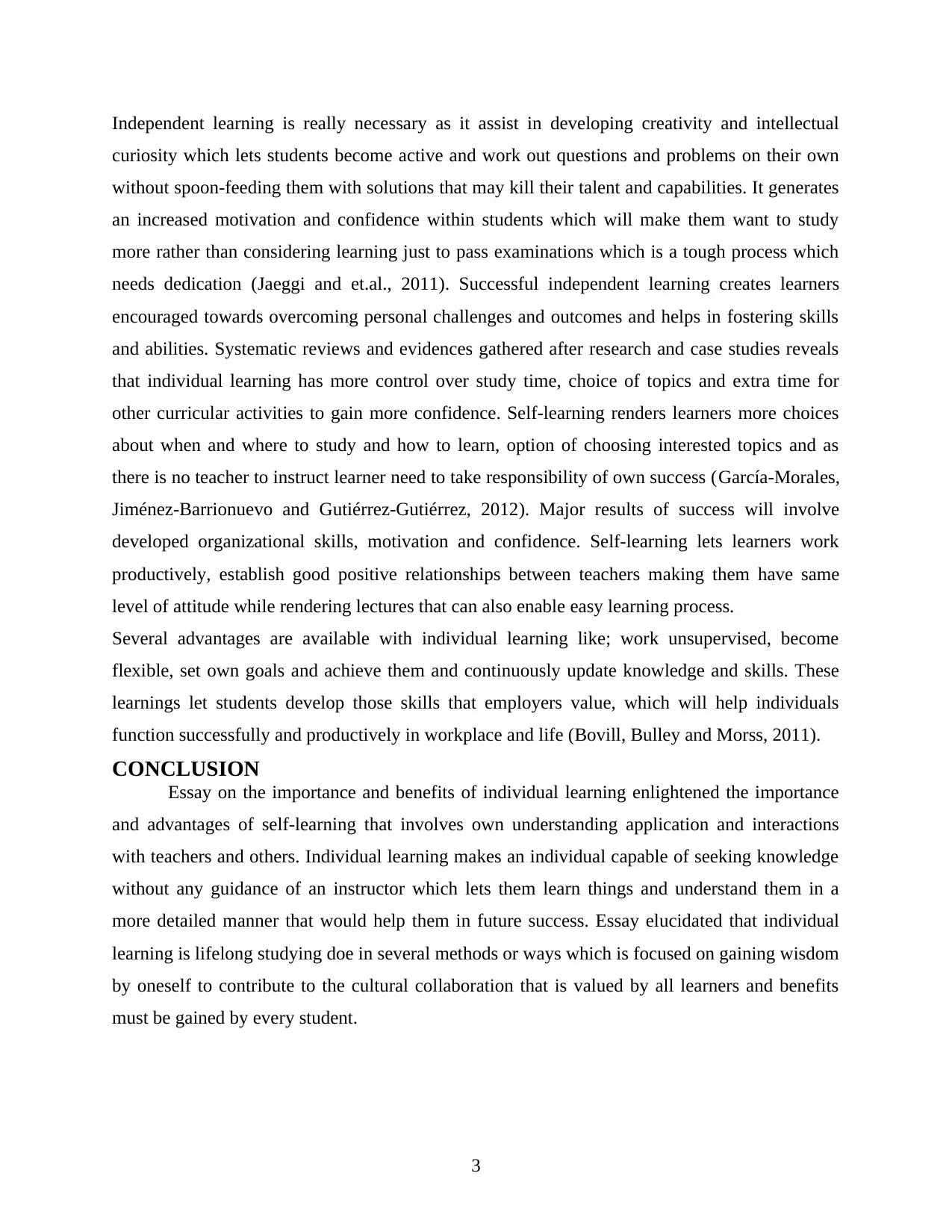
Independent learning is really necessary as it assist in developing creativity and intellectual
curiosity which lets students become active and work out questions and problems on their own
without spoon-feeding them with solutions that may kill their talent and capabilities. It generates
an increased motivation and confidence within students which will make them want to study
more rather than considering learning just to pass examinations which is a tough process which
needs dedication (Jaeggi and et.al., 2011). Successful independent learning creates learners
encouraged towards overcoming personal challenges and outcomes and helps in fostering skills
and abilities. Systematic reviews and evidences gathered after research and case studies reveals
that individual learning has more control over study time, choice of topics and extra time for
other curricular activities to gain more confidence. Self-learning renders learners more choices
about when and where to study and how to learn, option of choosing interested topics and as
there is no teacher to instruct learner need to take responsibility of own success (García-Morales,
Jiménez-Barrionuevo and Gutiérrez-Gutiérrez, 2012). Major results of success will involve
developed organizational skills, motivation and confidence. Self-learning lets learners work
productively, establish good positive relationships between teachers making them have same
level of attitude while rendering lectures that can also enable easy learning process.
Several advantages are available with individual learning like; work unsupervised, become
flexible, set own goals and achieve them and continuously update knowledge and skills. These
learnings let students develop those skills that employers value, which will help individuals
function successfully and productively in workplace and life (Bovill, Bulley and Morss, 2011).
CONCLUSION
Essay on the importance and benefits of individual learning enlightened the importance
and advantages of self-learning that involves own understanding application and interactions
with teachers and others. Individual learning makes an individual capable of seeking knowledge
without any guidance of an instructor which lets them learn things and understand them in a
more detailed manner that would help them in future success. Essay elucidated that individual
learning is lifelong studying doe in several methods or ways which is focused on gaining wisdom
by oneself to contribute to the cultural collaboration that is valued by all learners and benefits
must be gained by every student.
3
curiosity which lets students become active and work out questions and problems on their own
without spoon-feeding them with solutions that may kill their talent and capabilities. It generates
an increased motivation and confidence within students which will make them want to study
more rather than considering learning just to pass examinations which is a tough process which
needs dedication (Jaeggi and et.al., 2011). Successful independent learning creates learners
encouraged towards overcoming personal challenges and outcomes and helps in fostering skills
and abilities. Systematic reviews and evidences gathered after research and case studies reveals
that individual learning has more control over study time, choice of topics and extra time for
other curricular activities to gain more confidence. Self-learning renders learners more choices
about when and where to study and how to learn, option of choosing interested topics and as
there is no teacher to instruct learner need to take responsibility of own success (García-Morales,
Jiménez-Barrionuevo and Gutiérrez-Gutiérrez, 2012). Major results of success will involve
developed organizational skills, motivation and confidence. Self-learning lets learners work
productively, establish good positive relationships between teachers making them have same
level of attitude while rendering lectures that can also enable easy learning process.
Several advantages are available with individual learning like; work unsupervised, become
flexible, set own goals and achieve them and continuously update knowledge and skills. These
learnings let students develop those skills that employers value, which will help individuals
function successfully and productively in workplace and life (Bovill, Bulley and Morss, 2011).
CONCLUSION
Essay on the importance and benefits of individual learning enlightened the importance
and advantages of self-learning that involves own understanding application and interactions
with teachers and others. Individual learning makes an individual capable of seeking knowledge
without any guidance of an instructor which lets them learn things and understand them in a
more detailed manner that would help them in future success. Essay elucidated that individual
learning is lifelong studying doe in several methods or ways which is focused on gaining wisdom
by oneself to contribute to the cultural collaboration that is valued by all learners and benefits
must be gained by every student.
3
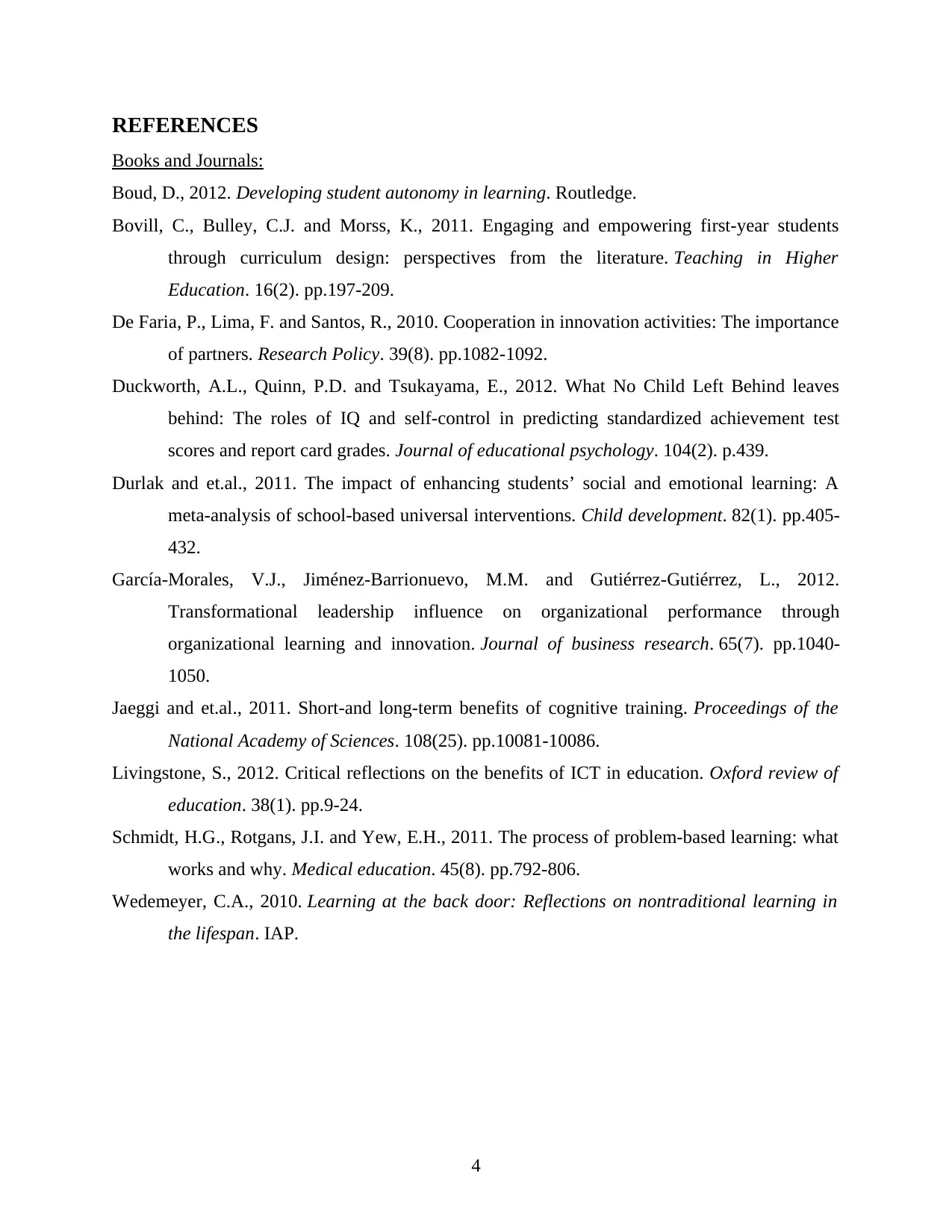
REFERENCES
Books and Journals:
Boud, D., 2012. Developing student autonomy in learning. Routledge.
Bovill, C., Bulley, C.J. and Morss, K., 2011. Engaging and empowering first-year students
through curriculum design: perspectives from the literature. Teaching in Higher
Education. 16(2). pp.197-209.
De Faria, P., Lima, F. and Santos, R., 2010. Cooperation in innovation activities: The importance
of partners. Research Policy. 39(8). pp.1082-1092.
Duckworth, A.L., Quinn, P.D. and Tsukayama, E., 2012. What No Child Left Behind leaves
behind: The roles of IQ and self-control in predicting standardized achievement test
scores and report card grades. Journal of educational psychology. 104(2). p.439.
Durlak and et.al., 2011. The impact of enhancing students’ social and emotional learning: A
meta‐analysis of school‐based universal interventions. Child development. 82(1). pp.405-
432.
García-Morales, V.J., Jiménez-Barrionuevo, M.M. and Gutiérrez-Gutiérrez, L., 2012.
Transformational leadership influence on organizational performance through
organizational learning and innovation. Journal of business research. 65(7). pp.1040-
1050.
Jaeggi and et.al., 2011. Short-and long-term benefits of cognitive training. Proceedings of the
National Academy of Sciences. 108(25). pp.10081-10086.
Livingstone, S., 2012. Critical reflections on the benefits of ICT in education. Oxford review of
education. 38(1). pp.9-24.
Schmidt, H.G., Rotgans, J.I. and Yew, E.H., 2011. The process of problem‐based learning: what
works and why. Medical education. 45(8). pp.792-806.
Wedemeyer, C.A., 2010. Learning at the back door: Reflections on nontraditional learning in
the lifespan. IAP.
4
Books and Journals:
Boud, D., 2012. Developing student autonomy in learning. Routledge.
Bovill, C., Bulley, C.J. and Morss, K., 2011. Engaging and empowering first-year students
through curriculum design: perspectives from the literature. Teaching in Higher
Education. 16(2). pp.197-209.
De Faria, P., Lima, F. and Santos, R., 2010. Cooperation in innovation activities: The importance
of partners. Research Policy. 39(8). pp.1082-1092.
Duckworth, A.L., Quinn, P.D. and Tsukayama, E., 2012. What No Child Left Behind leaves
behind: The roles of IQ and self-control in predicting standardized achievement test
scores and report card grades. Journal of educational psychology. 104(2). p.439.
Durlak and et.al., 2011. The impact of enhancing students’ social and emotional learning: A
meta‐analysis of school‐based universal interventions. Child development. 82(1). pp.405-
432.
García-Morales, V.J., Jiménez-Barrionuevo, M.M. and Gutiérrez-Gutiérrez, L., 2012.
Transformational leadership influence on organizational performance through
organizational learning and innovation. Journal of business research. 65(7). pp.1040-
1050.
Jaeggi and et.al., 2011. Short-and long-term benefits of cognitive training. Proceedings of the
National Academy of Sciences. 108(25). pp.10081-10086.
Livingstone, S., 2012. Critical reflections on the benefits of ICT in education. Oxford review of
education. 38(1). pp.9-24.
Schmidt, H.G., Rotgans, J.I. and Yew, E.H., 2011. The process of problem‐based learning: what
works and why. Medical education. 45(8). pp.792-806.
Wedemeyer, C.A., 2010. Learning at the back door: Reflections on nontraditional learning in
the lifespan. IAP.
4
⊘ This is a preview!⊘
Do you want full access?
Subscribe today to unlock all pages.

Trusted by 1+ million students worldwide

5
1 out of 7
Related Documents
Your All-in-One AI-Powered Toolkit for Academic Success.
+13062052269
info@desklib.com
Available 24*7 on WhatsApp / Email
![[object Object]](/_next/static/media/star-bottom.7253800d.svg)
Unlock your academic potential
Copyright © 2020–2025 A2Z Services. All Rights Reserved. Developed and managed by ZUCOL.




